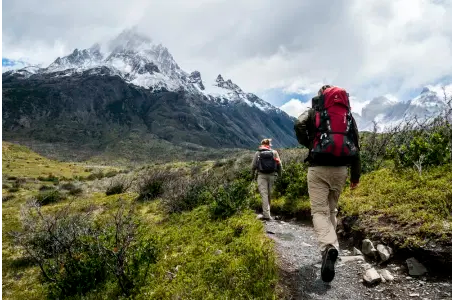
There is a sense of calm everyone associates with nature. Whether it is hiking amongst vibrant layers of fall foliage or watching a waterfall striking the stream below, spending time interacting with nature provides peace and a much-needed break from life’s daily sprint.
In the age of technology, though, people rarely spend enough time outside and instead get tangled up in high-stress work situations even outside of their 9-5 job. This issue has been exacerbated by the ongoing pandemic, as many feel unsafe leaving quarantine, and the clear temporal boundaries have grayed and bled into what’s typically “alone-” or “family time.” However, it is increasingly important that in uncertain and anxiety-ridden times like these, we find ways to escape and de-stress.
Doctors throughout the United States are increasingly prescribing time outdoors to their patients. Regularly interacting with nature has been described as, “one of the best self-improvement tools,” and, “a simple way to help reduce stress, anxiety, and depression, and maybe even improve your memory.” ‘Regular interaction’ can mean anything from 20 to 30 minutes, 3 days a week, but a goal of at least 120 minutes per week will provide the most benefit.
Taking this valuable couple of hours to spend in nature has upsides stretching beyond mental health as well. A stressful environment can elevate blood pressure, heart rate, and muscle tension while suppressing your immune system, but calming nature sounds and a more pleasing environment can reverse those effects. Recently, the scientific fields of ecotherapy and ecopsychology, which aim to positively shape minds with nature, have been growing as nature has been credited for improving mental health, mood, physical health, and vitality.
Upon returning from a moment in nature, many take on a more positive and relaxed mood, feeling energized and refreshed. Nature provides a respite for overactive minds, and time in nature may increase productivity in the new tasks that follow. Dr. David Strayer, who is currently researching the correlation between time in nature and changes in the brain, believes being in nature, “restores depleted attention circuits, which can then help us be more open to creativity and problem-solving.”

Furthermore, forest-bathing, a practice within ecotherapy, has been shown to improve executive functioning skills such as completing tasks, planning, prioritizing, and managing emotions. These increases in productivity, efficiency, and creativity suggest that time in nature could foster better performance in the workplace.
Though less studied, nature may also have an impact on one’s social wellbeing and tendencies. Some scientists believe that nature inspires feelings that make us feel connected not only to the environment, but also to others. Nature can strengthen relationships, as being outdoors influences willingness to be trusting, generous, and helpful toward others. A study by University College London found that children’s experiences in the natural world fostered better relationships with teachers and classmates.
Additionally, a separate study observing a group of Canadian elementary school children found that regular contact with nature over 8 months had profound benefits on children’s pro-social behaviors, including social, language, and communication skills. Though the effect on the social behaviors of adults may not be as drastic, nature can influence our ability to connect with other people nonetheless. Individuals connected to nature tend to be conscientious, extroverted, agreeable, and open, which promotes engagement and sociability. Given that research, don’t you want to mobilize yourself and enjoy some time in nature?
- https://www.health.harvard.edu/mind-and-mood/sour-mood-getting-you-down-get-back-to-nature
- https://www.takingcharge.csh.umn.edu/how-does-nature-impact-our-wellbeing
- https://greatergood.berkeley.edu/article/item/how_nature_makes_you_kinder_happier_more_creative
- https://medicalxpress.com/news/2019-11-nature-children-confidence.html
- https://nebocompany.com/forest-bathing-benefits/
- http://www.washington.edu/admin/hr/publications/email/pod/convio/leadingedge/su14/leadingedge-nature.html
- https://www.frontiersin.org/articles/10.3389/fpsyg.2014.00976/full
- https://www.frontiersin.org/articles/10.3389/fpsyg.2019.02942/full
- https://www.sciencedirect.com/science/article/pii/S0272494418307102

